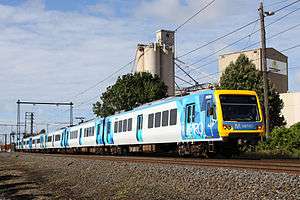Public Transport Victoria
Public Transport Victoria (stylised as PT>, pronounced PTV) is the brand name for public transport in the Australian state of Victoria. It was the trading name of the Public Transport Development Authority (PTDA), a now-defunct statutory authority in Victoria, responsible for providing, coordinating and promoting public transport.
 | |
| Agency overview | |
|---|---|
| Formed | 2 April 2012 |
| Preceding agencies | |
| Type | Statutory authority |
| Jurisdiction | Government of Victoria |
| Headquarters | Collins Street, Melbourne, Australia |
| Employees | 504 (June 2018) |
| Minister responsible |
|
| Agency executives |
|
| Parent department | Department of Transport |
| Website | www |
_Custom_Coaches_bodied_Scania_in_PTV_livery_on_route_250_in_Queen_St%2C_December_2013.jpg)
The PTV began operating on 2 April 2012, taking over many of the responsibilities previously exercised by the Director of Public Transport and the Department of Transport. It also took over the marketing of public transport in Victoria from Metlink and Viclink, as well as responsibility for the myki ticketing system, formerly handled by the Transport Ticketing Authority.[1][2]
PTV's functions were transferred to the Department of Transport on 1 July 2019. However, PTV continues to exist as the brand for public transport services in Victoria.
Governance
PTV is the trading name of the Public Transport Development Authority (PTDA). The PTDA was established by the Transport Legislation Amendment (Public Transport Development Authority) Act 2011,[3] passed by the Parliament of Victoria in November 2011, which positioned the agency under the State's primary transport statute, the Transport Integration Act. The legislation provides that the "...primary object of the Public Transport Development Authority is to plan, coordinate, provide, operate and maintain a safe, punctual, reliable and clean public transport system....".[4]
Key functions
Government expectations
In introducing the legislation, the then Minister for Public Transport, Terry Mulder, observed that:
"This bill is an essential step to fix the problems in Victoria's public transport system. The bill establishes a new statutory authority, the Public Transport Development Authority (the PTDA), to plan, coordinate and manage all metropolitan and regional train, tram and bus services.
The PTDA will focus on the basics of a good public transport system.
It will be responsible and accountable for achieving significant improvement in the reliability, efficiency and integration of public transport services across the state.
In a key change of focus, the new authority will put passengers first.
It will operate as the face of public transport, providing a single shopfront for passengers and stakeholders.
No longer will Victorians have to endure the confusion, the blame shifting and the frustration that characterised the state's troubled public transport system over the previous decade."[5]
Contracting activities with train, tram and bus operators

_in_Elizabeth_St_on_route_19_to_City_in_PTV_livery%2C_December_2013.jpg)
_Volgren_bodied_Scania_in_PTV_livery_on_route_216_in_Queen_St%2C_December_2013.jpg)
PTV enters into contracts on behalf of the State with transport operators to provide train, tram and bus services throughout Victoria. The key franchise contracts which were transferred to PTV from the former Director of Public Transport relate to:
- Trains in Melbourne (contract with Metro Trains Melbourne) – covering suburban rail services in Melbourne.
- Trams in Melbourne (with Keolis Downer) – covering suburban tram and light rail services in Melbourne.
- Trains in regional Victoria (with V/Line Corporation) – covering train services in country Victoria.
- Bus services in Melbourne and throughout Victoria, including school bus services involving a large number of bus operators, and their umbrella body, the Bus Association of Victoria.[6]
VicTrack, the custodian of all rail infrastructure and assets in Victoria, leases the metropolitan train and tram infrastructure and assets to PTV through the Metropolitan Infrastructure Head Lease. PTV then sub-leases the assets to the metropolitan train and tram operators through Infrastructure Leases. PTV manages the rights and obligations contained in these leases on behalf of the State. PTV also enters into franchise agreements with the metropolitan train and tram operators that govern the provision of public transport services. The franchise agreements specify a range of operational and service requirements administered and managed by PTV.
Regional rail services operated by V/Line Corporation are subject to similar arrangements involving VicTrack and PTV. VicTrack leases the regional rail infrastructure and assets to PTV which then sub-leases them to V/Line under the Regional Infrastructure Lease. Similarly, PTV and V/Line have entered into a franchise agreement which governs the operational and service requirements for regional rail services.
PTV's position in transport portfolio
PTV is one of the statutory agencies in the Victorian transport portfolio whose activities are coordinated by the Department of Transport. These agencies can be divided into three main types - statutory offices, statutory authorities and independent transport safety agencies.
Together with DOT, the agencies provide, manage and regulate transport system activities in Victoria including -
Key people
The inaugural chairman and chief executive officer (CEO) of PTV was Ian Dobbs, who had headed the former Victorian Public Transport Corporation between 1993 and 1998.[9] On 1 February 2014, the positions of chairman and CEO were split, as provided for in the original legislation, and Mark Wild was appointed CEO of PTV, with Dobbs remaining as chairman.[10] The current CEO, Jeroen Weimar, began his term of office in September 2016, having been acting CEO since January 2016.[11]
The legislation also states that there must be a community representative on the PTV board.[12] On 1 July 2014, John Nicol, executive director of the Werribee-based Nicol Group, was appointed to that position.
Authorised Officers
Authorised Officers perform a ticket inspection role across the network and have special powers on buses, trains and trams and at public transport stops and stations. They have authority to ask to see a passenger’s ticket or concession card, ask for a passenger’s name and address, and proof of identity, fine or arrest a passenger, take away things like alcohol, invalid tickets or spray cans, or eject people from public transport property. They do not have authority to search a person or their things, seize stuff that is not illegal to have it on public transport, or phone or force a person to delete data from it. They cannot abuse persons or use unnecessary force.[13]
Authorised Officers have been the subject of public concern arising from the number of complaints about their allegedly excessive use of force. In 2013, a 15-year-old girl was picked up and allegedly spear-tackled after punching one authorised officer in the face, and spitting on another after being stopped over a ticketing offence.[14] There were 220 formal complaints about authorised officers in the 2013 financial year, compared with 138 a year earlier.[15]
Abolition
The PTV ceased to exist as an independent entity from 30 June 2019 and merge with VicRoads to form a new division of the Department of Transport. A transport branding strategy was proposed to be completed before the merge takes effect,[16][17][18] however, no branding strategy had been announced yet. As such, PTV continues to be the brand of public transport services in Victoria.
See also
References
- Ashley Gardiner (22 March 2012). "Transport bureaucrats told to hit the road". Herald Sun. Retrieved 1 April 2012.
- "Public Transport Victoria now operating". 1 April 2012. Archived from the original on 7 July 2012. Retrieved 1 April 2012.
- See section 3, Transport Legislation Amendment (Public Transport Development Authority) Act 2011.
- New section 79AD added to the Transport Integration Act by section 3 of the Transport Legislation Amendment (Public Transport Development Authority) Act 2011
- Terry Mulder MLA, Hansard, Legislative Assembly, 14 September 2011, page 3210.
- "Welcome". Bus Association Victoria Inc. Retrieved 11 December 2013.
- Note, some shipping matters are controlled by the Commonwealth government under legislation such as the Navigation Act 1912. Other matters are within the jurisdiction of states such as Victoria through Acts such as the Transport Integration Act and other statutes such as the Marine Act 1988.
- Note, many air transport regulation matters are controlled by the Commonwealth Government. The Transport Integration Act would apply, for example, to planning controls at some airports and in respect of transport connections to other airports by road and rail.
- Clay Lucas (24 August 2011). "Comeback for Kennett-era transport chief". The Age. Retrieved 30 April 2012.
- "New Chief Executive Officer for Public Transport Victoria". Public Transport Victoria. Retrieved 17 March 2014.
- "Appointment Of Public Transport Victoria CEO". Premier of Victoria. 9 September 2016. Retrieved 23 August 2018.
- Bowen, Daniel. "PTV: it's more than just rebranding, but will it make a difference?". Diary of an Average Australian. Retrieved 17 March 2014.
- Ticket Inspectors
- Adam Carey (11 December 2013). "Girl 'spear tackled' by Metro officer is under Anglicare's guardianship". The Age. Retrieved 11 December 2013.
- Nick Toscano (28 November 2013). "MELBOURNE: Myki, inspector complaints soar". Wyndham Weekly. Retrieved 11 December 2013.
- Carey, Adam (4 April 2019). "Big merger: VicRoads and PTV to become one mega-agency". The Age. Retrieved 7 April 2019.
- Donaldson, David (3 April 2019). "VicRoads and PTV to be rolled into Transport Department". The Mandarin. Retrieved 7 April 2019.
- "The end of VicRoads, PTV: Neil Mitchell's inside word on Victoria's transport merger". 3AW News. 4 April 2019. Retrieved 7 April 2019.
